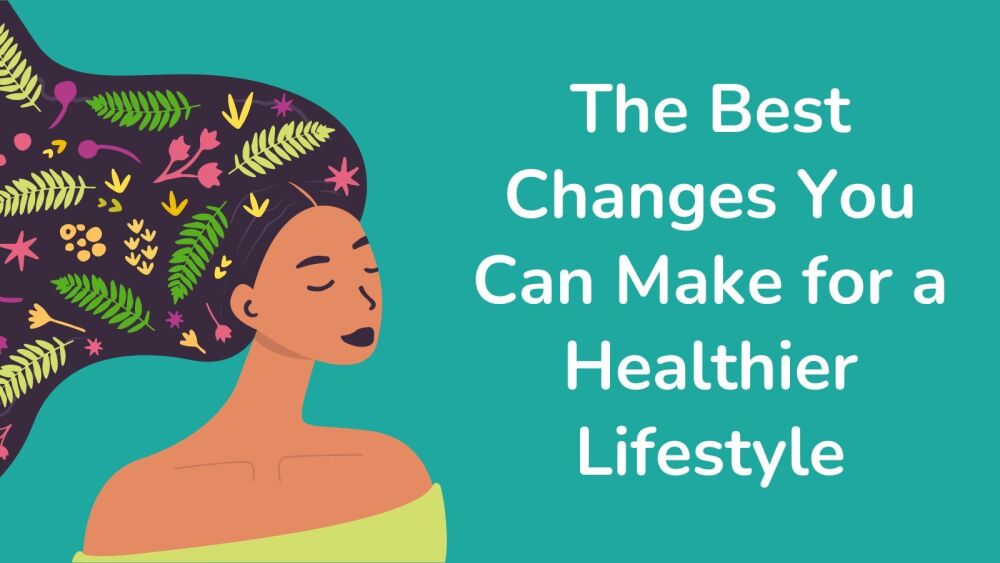The Best Changes You Can Make for a Healthier Lifestyle
Posted on
There are many ways we can change our daily habits and lifestyle choices that will benefit our short- and long-term health. From quitting smoking or becoming more active, to improving relationships in your life and boosting your mental health.
In this article, we will explore these and more lifestyle changes that will benefit your physical and mental health. If you want to learn more about how to change your lifestyle to be healthy and how you can stick to these changes, then keep reading.

-
Giving Up Cigarettes
According to Quit Clinics, giving up smoking is a transformative step towards improved health and well-being. It liberates your body from the harmful effects of nicotine and other chemicals found in cigarettes, leading to significant health benefits.
Quitting smoking reduces the risk of numerous diseases, including heart disease, stroke, and various types of cancer. It also enhances lung capacity, improves circulation, and boosts overall energy levels. The positive impact extends beyond physical health, contributing to mental clarity and emotional stability.
The best ways to quit smoking often involve a combination of strategies. Setting a quit date and sticking to it creates a sense of commitment. Seeking support from friends, family, or support groups can provide encouragement and accountability. Utilising nicotine replacement therapies (NRTs) like patches, gum, or lozenges can ease withdrawal symptoms. Vaping can be a good way to help replace harmful cigarettes, and there are wide variety of flavoured juices and nicotine replacements for vapes.
Engaging in regular exercise and adopting stress-reducing practices like meditation or yoga can help manage cravings. It's also beneficial to avoid triggers and replace smoking habits with healthier alternatives, such as snacking on fruits or engaging in a hobby.
Some people use hypnotherapy to stop smoking. Remember, quitting is a personal journey, and what works for one person may not work for another. It's about finding the right combination of techniques that suits your individual needs.
-
Becoming More Active
Becoming more active is a pivotal step towards a healthier life. Regular physical activity boosts cardiovascular health, reducing the risk of heart disease and stroke. It strengthens muscles and bones, enhancing overall physical strength and flexibility.
Exercise also plays a crucial role in weight management and can help prevent obesity and related conditions like diabetes. Beyond physical benefits, it improves mental health, reducing symptoms of depression and anxiety, and enhances cognitive function.
To best achieve an active lifestyle, start with small, achievable goals. Incorporating activities you enjoy, like dancing, hiking, or team sports, makes exercise more enjoyable and sustainable. Gradually increase intensity and duration to avoid burnout.
Mix different types of activities (aerobic, strength training, flexibility exercises) for a balanced routine.
Remember, consistency is key, so aim for regular activity each week. It's also important to listen to your body and rest when needed. An active lifestyle is about making movement a natural and enjoyable part of your daily life.
-
Socialising More
Socialising more can have a profound impact on mental health. Engaging with others provides emotional support, reduces feelings of loneliness, and can help combat depression and anxiety. Social interactions stimulate the brain, improving cognitive functions and potentially lowering the risk of dementia. They also offer opportunities for laughter and joy, boosting mood and overall well-being.
To socialise more, start by reaching out to existing friends and family, and consider regular meet-ups. Join clubs or groups that align with your interests, be it a book club, sports team, or a hobby group, as shared interests provide natural conversation starters.
Volunteering is another great way to meet people while contributing to the community.
Embrace technology to stay connected, especially with those far away. Importantly, be open to new experiences and stepping outside of your comfort zone. Building a social network takes time, so be patient and persistent.
-
Spending More Time Outdoors
Spending more time outdoors and in nature benefits mental health as well as physical health. Natural settings reduce stress, anxiety, and depression. Sunlight exposure boosts Vitamin D levels, enhancing mood and energy. Being outside often involves physical activity, which further improves mental well-being. Nature's serenity can offer a refreshing escape from the hustle of daily life, encouraging mindfulness and a sense of peace.
To spend more time outdoors, start by integrating short walks into your daily routine. Plan outdoor activities like hiking, cycling, or gardening on weekends. If you work indoors, consider taking breaks or having lunch outside. Explore local parks and nature reserves.
Engaging in outdoor hobbies like photography or bird watching can also be motivating. Incorporate outdoor time with social activities by inviting friends or family on walks or picnics. Remember, even small, regular doses of nature can have a significant positive impact on mental health.
-
Finding A Balance Between Work And Down-Time
Balancing work and life are crucial for mental health. It prevents burnout, reduces stress, and fosters a sense of well-being. When work-life balance is achieved, productivity increases, and relationships outside work improve, leading to greater overall happiness.
To achieve better balance, set clear boundaries between work and personal time. Prioritise tasks and learn to say no to avoid overcommitment. Schedule regular breaks during work and ensure leisure time is truly relaxing and enjoyable.
Utilise time management tools and delegate tasks when possible. Practice self-care routines and hobbies to unwind. Most importantly, communicate your needs and limitations to employers and family, fostering understanding and support.
-
Having Counselling Sessions
Counselling is a powerful tool for enhancing mental health. It provides a safe, confidential space to explore and understand personal challenges, thoughts, and feelings you might be experiencing. Counsellors offer professional guidance, helping individuals develop coping strategies and resilience.
Counselling can aid in managing and overcoming mental health issues such as depression, anxiety, and stress. It also promotes self-awareness, personal growth, and better decision-making skills.
By facilitating open communication, counselling helps in resolving conflicts and improving relationships. Whether for specific issues or general well-being, it can help offer support and empowerment, improving your mental health and a more fulfilling life.
-
Addressing Health Concerns
Addressing health concerns promptly is vital for maintaining good health and well-being. Early intervention often results in better health outcomes, as many conditions are more manageable when detected early. It can prevent complications, reduce the risk of chronic diseases, and sometimes even save lives.
Prompt action allows for timely treatment, potentially reducing the duration and severity of illnesses. It also helps avoid escalating minor health issues into more serious ones.
Addressing your health concerns quickly alleviates anxiety and uncertainty, helping to boost your mental wellbeing. Don’t let health concerns go unattended and worry you, get them addressed so you can start getting the support you need.
-
Cutting Down On Alcohol Consumption
Cutting down on alcohol consumption brings significant health benefits, including reduced risk of liver disease, heart problems, and certain types of cancer. It can lead to better sleep, improved mental health, and enhanced weight management.
To reduce alcohol intake, start by setting clear, realistic goals. Keep track of how much you drink and set limits. Opt for lower-alcohol or alcohol-free alternatives. Avoid situations where you'll likely drink excessively and find other ways to relax and unwind, like exercise or hobbies. Drink slowly and alternate alcoholic drinks with water. Remember, reducing alcohol consumption is a step towards a healthier lifestyle, leading to long-term physical and mental health benefits.
Final thoughts
Whether you’re trying to balance your workload better, get into nature more, or want to make your health more of a priority, there are a number of ways you can make healthy changes to your life.
Remember, dedication and consistency are key to ensuring healthy habits stick and will lead to a healthier overall lifestyle.


